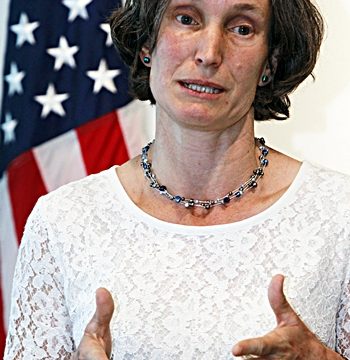Ed secretary: Teacher tenure ruling will have little impact on Vermont

KEEP THEM ALL: Vermont Secretary of Education Rebecca Holcombe says firing bad teachers is not a good way to improve education quality.
By Bruce Parker | Vermont Watchdog
A judge’s decision to strike down teacher tenure in California has sparked nationwide debate over teacher performance and dismissal, but Vermont’s secretary of education said the ruling will have little impact on teachers in the Green Mountain State.
“It’s not a binding precedent for Vermont at this point,” Education Secretary Rebecca Holcombe told Vermont Watchdog.
On Tuesday, a Los Angeles County judge ruled California’s tenure laws violated students’ rights to an education. According to the judge, the state’s inability to terminate poor-performing teachers hurt education quality and was harmful to poor and minority students.
U.S. Secretary of Education Arne Duncan, who hailed the decision as “a mandate” for fixing teacher performance problems in California and other states, said equal opportunities for learning “must include the equal opportunity to be taught by a great teacher.”
According to the ruling, states must have the ability to fire ineffective teachers to ensure equal opportunity.
But Holcombe, who took the helm at the Agency of Education in January, said firing teachers should not be viewed as a means to achieving education quality.
“I don’t think you can fire your way to Finland. You can’t get to high-quality teaching by firing people,” she said.
Instead of seeking to remove underperforming educators, Holcombe said Vermont should “provide teachers with support and help them get better.”
Unlike in California, Vermont’s public school teachers don’t get tenure. Terminating teachers is, nevertheless, a highly involved process.
“In Vermont, if you’re going to non-renew or terminate a teacher, there’s a lot of work to be done,” Rob Bliss, assistant superintendent of Rutland City public schools, told Vermont Watchdog. “And it should be that way. You can’t just have people arbitrarily dismissing personnel for reasons that aren’t founded.”
According to the superintendent, state law identifies multiple grounds for dismissing a teacher. Educators can be terminated for failure to attend to duties, for insubordination and for conduct unbecoming of a teacher.
“The fact is, though, if a teacher’s going to be removed for nonperformance, the critical piece is the evaluation, supervision and documentation,” Bliss said.
Although the Agency of Education doesn’t track how many teachers are terminated or not renewed each year, a mandatory statewide survey published in 2010 sheds light on the teacher evaluation process, which varies by district.
In Vermont, all new teachers are placed on a two-year probationary period characterized by close monthly supervision and training. Poorly performing teachers are placed on probation and receive similar oversight throughout the school year. All other teachers receive a performance evaluation on either a one-year or three-year cycle.
Principals who conduct the performance reviews evaluate teachers primarily on content knowledge, curriculum planning, classroom management, instructional delivery and communication with parents.
Interestingly, 82.5 percent of Vermont’s principals said student achievement was not considered during teacher evaluations.
Moreover, 96.4 percent said teacher performance results were not made available to the public.
Eric Lerum, vice president of national policy for StudentsFirst, an education-reform group founded by Michelle Rhee, said parents have a right to know how teachers are performing.
“Parents don’t have access to that information, and we need to be more transparent. States should put in policies that, at a minimum, require districts to report data at the district level and school level on teacher effectiveness,” he said.
Lerum said parents should also be told if their child is being placed with a teacher who is undergoing probationary review due to performance problems.
“If your child is going to be placed with an ineffective teacher, you as a parent have a right to know that. …We see how far a child can fall behind his or her peers if he or she gets an ineffective teacher.”
Darren Allen, a spokesman for the Vermont NEA, which strongly opposes the California ruling, nevertheless told Vermont Watchdog “teachers who aren’t getting the job done don’t belong in public schools.”
“In Vermont, it’s rare that it happens, but it happens every year,” he said.
While the Vermont NEA doesn’t track the number of teachers who are fired or not retained, Allen confirmed most teachers are renewed every year.
“Nobody wants ineffective teachers,” Allen said. Nevertheless, he denounced Duncan’s support of the California ruling as model for reforming education nationwide.
“What Arne Duncan said, well, it’s a little disingenuous on his part. Making it easier to fire teachers is not the way to improve education.”
Holcombe appears to agree.
“To (suggest) a court ruling in a state court in California is going to be a mandate for the entire country is possibly a misunderstanding of our legal system,” she said. “… (Also), I don’t agree with the premise that it’s impossible to fire a bad teacher.”
Contact Bruce Parker at bparker@watchdog.org







